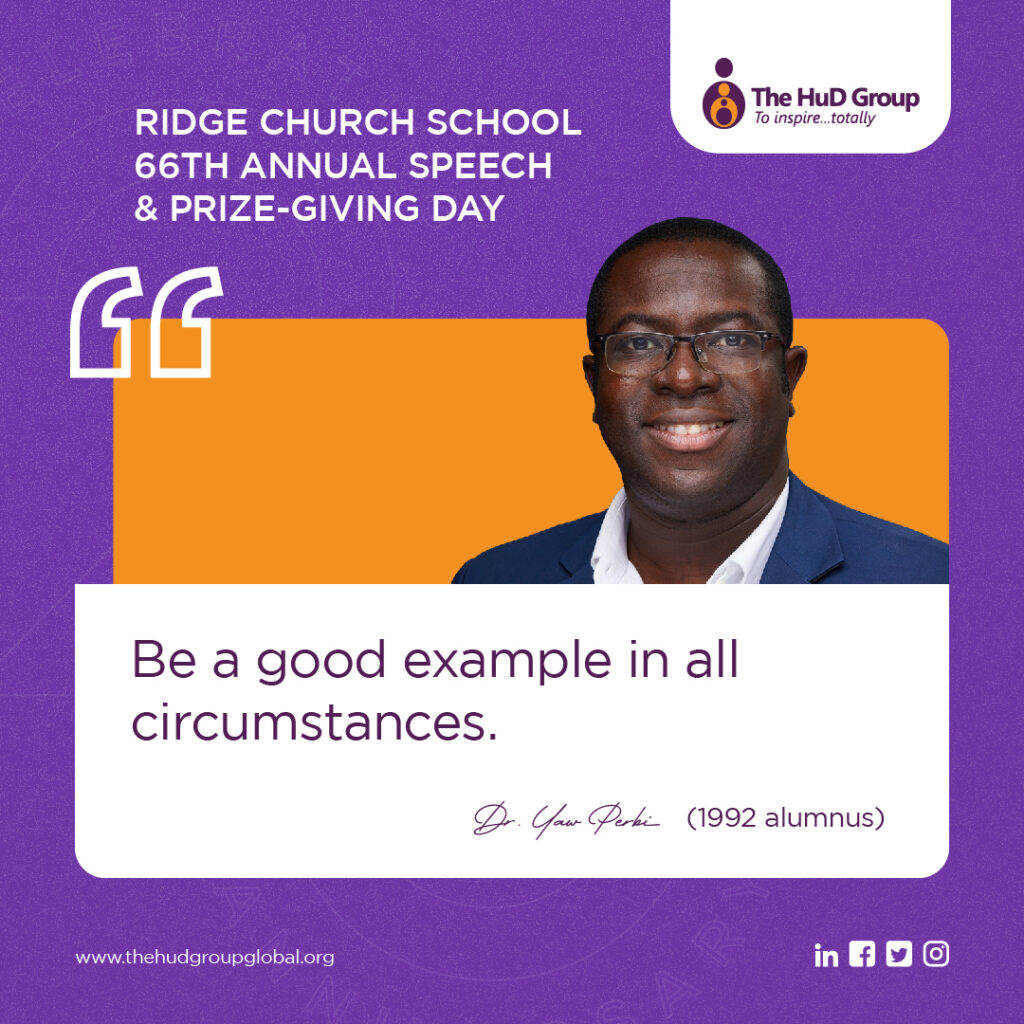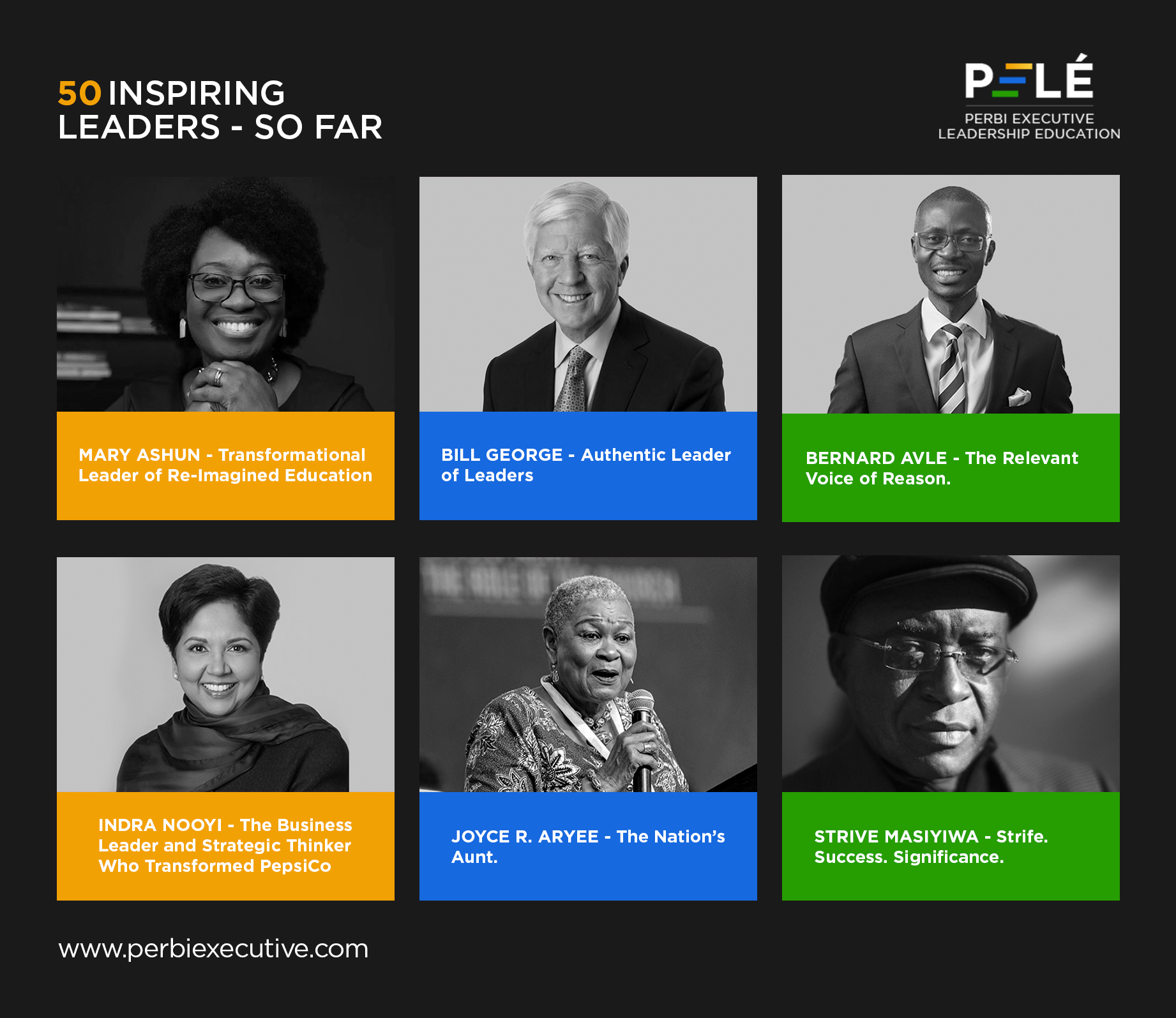
50 Inspiring Living Leaders
Dear Leader,
If you haven’t yet checked out the first 10% of the 50 Inspiring Living Leaders on the Perbi Executive Leadership Education (PELÉ) website, catch up quickly and get some oxygen for you leadership journey:
1. STRIVE MASIYIWA—Strife. Success. Significance: https://perbiexecutive.com/strife-success-significance…/
2. JOYCE ARYEE—A Nation’s Aunt: https://perbiexecutive.com/a-nations-aunt-joyce-r-aryee/
3. INDRA NOOYI—The Business Leader and Strategic Thinker Who Transformed PepsiCo: https://perbiexecutive.com/indra-nooyi-the-business…/
4. BERNARD AVLE—The Relevant Voice of Reason: https://perbiexecutive.com/bernard-avle-the-relevant…/
5. BILL GEORGE—Authentic Leader of Leaders: https://perbiexecutive.com/bill-george-authentic-leader…/
6. MARY ASHUN—Transformational Leader of Re-Imagined Education: https://perbiexecutive.com/mary-ashun-transformational…/
This 50 Inspiring Living Leaders series highlights current influencers who are succeeding in leadership, integrity, family or entrepreneurship in whatever field and exhibit most, if not all, of our values of PELÉ. We value people, growth, particularity, excellence, success, authenticity and significance. These stories are largely written in terms of growth, success and significance in leadership, integrity, family and entrepreneurship. While we do our best to receive personal references about each leader, most of our research and writing is based on literature review of publicly-available information. As authorities in leadership, we are fully aware that there is no such thing as a perfect leader, and leaders may have their flaws, but we choose to celebrate these inspiring living leaders for their achievements outlined in our series. Having said that, should you happen to have any incontrovertible evidence that any of our featured leaders does not fit our bill of an authentic leader, please write to us at info@perbiexecutive.com. Our vision at PELÉ is a flourishing global ecosystem of authentic leaders characterised by healthy growth, holistic success and lasting significance.
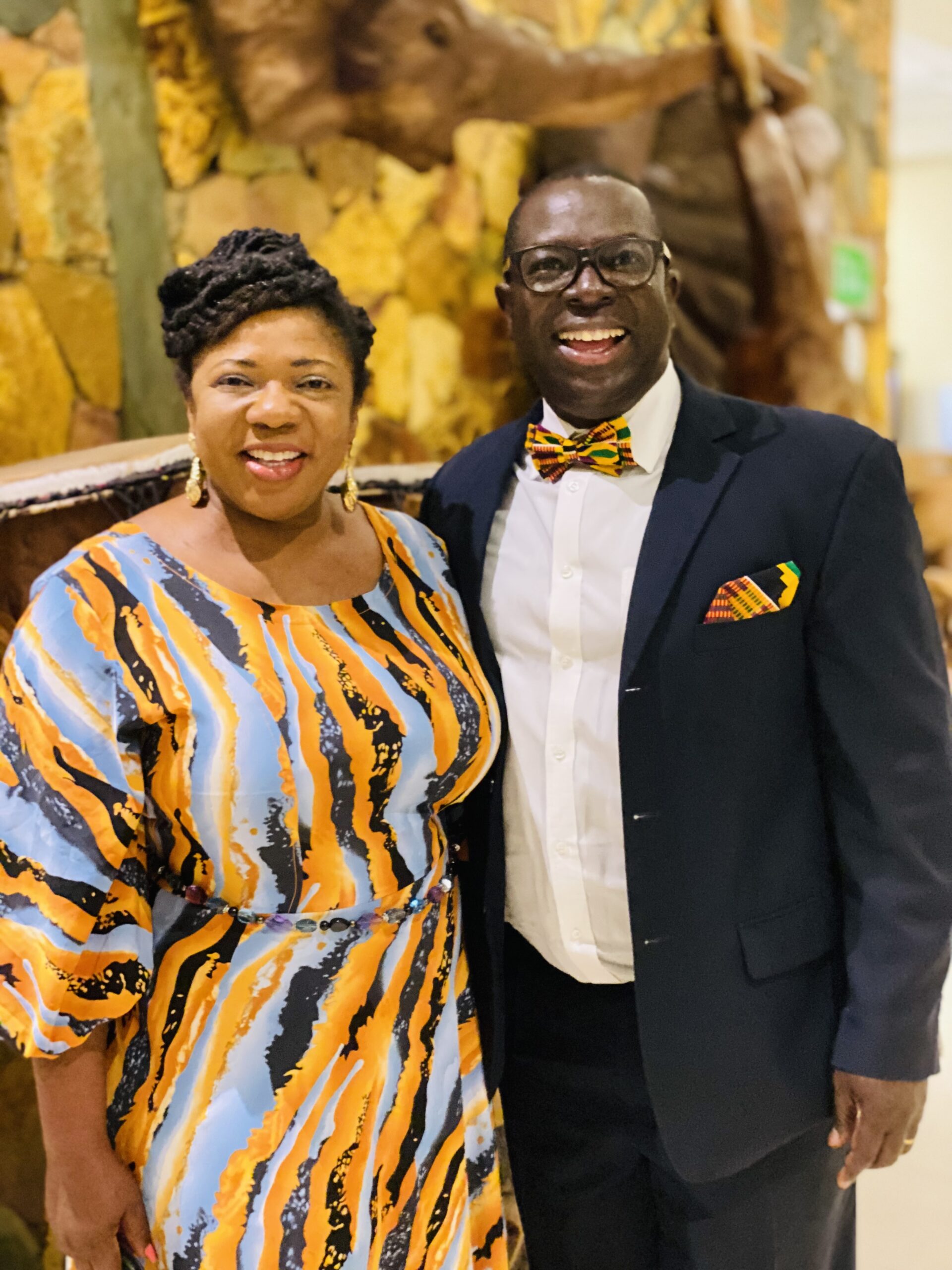
Meet The Nursing Doctor That Beat “Medico or Suicide!” Fair and Square
In those mid ’90s, one had to do a year (Level 200—if from the old O’ and A’ level system) or two years (Levels 100 and 200—from the new Junior and Senior Secondary School system) to see who qualifies, per superior GPA, to be called for the University of Ghana Medical School interview.
If my memory serves me right, of the nearly 900 of us, only a third made the interview list; and of that, only another third were admitted to medical (and dental) school. Folks were so bent on making the final 100 who will don the coveted white coat and carry boxes of bones on and off the med school bus that the mantra was “medico or suicide!” It was a serious threat in those heady undergraduate days.
I personally don’t recall anyone who didn’t make the cut actually physically killing themselves but many died emotionally, mentally and even socially. That nonsense killed many brilliant minds. I know of some that had to take a year off to heal; some even left the country for a bit. I still meet people who seem to be a pale shadow of themselves prior to this deathly mantra.
CAREER = PROFESSION + FIELD
I hope that career and counselling services have improved for the current generation but I can tell you for a fact that most of us were too young, back in the 1990s, to even definitely know what we wanted, career-wise. O of course many of us thought we knew, just like we thought we knew who we wanted to marry. Probably 0.0001% of us ended up marrying who we ‘so sure’ about.
In fact, many of us mixed up the passion for the general field (healthcare) with a passion for a particular profession (medical doctor). I was fortunate to learn the CAREER = PROFESSION + FIELD formula from the What Colour is Your Parachute? publication and many in that biological sciences pool could’ve found use for it too. Take my friend Retha (true story but not her real name), for example. She was a couple of years behind me. She didn’t make the dreaded med school list. And you wouldn’t believe the kind of hell her parents subjected her to, as a result. Thankfully she weathered the storm and did great at her plan B: Psychology. She loved it and excelled at Clinical Psychology in particular so much that she continued with graduate studies and eventually landed a PhD in it, in the United States of America.
Think about it: she still ended up in the field of healthcare which she was passionate about but realised she didn’t need to have the profession of a medical doctor to pursue that passion. The competent psychologist she became satisfied the same passion and fulfilled her calling. In any case, she’s still called “Dr.” today in her practice and who the heck cares if she earned the “Dr.” title from med school or from grad school, especially if she’s doing one heck of a good job in the clinic.
THE NURSING DOCTOR
These thoughts above were provoked by attending a recent Doctors in Business banquet at the Holiday in Accra, Ghana. As a guest keynote speaker, I had the privilege of sharing the high table with a course mate from Level 100 at the University of Ghana, Legon. We were both introduced as “Doctor” but I could swear she wasn’t in med school with me. By the end of the night it turned out that both the MC and myself were right. She was not med school with our batch, and she isn’t a medical doctor (I was right); but she is a doctor alright, a doctor in nursing (the MC was right).
“So I did biological sciences with you guys at Level 100 because I came to Legon as a science student,” Dr. Lillian Akorfa Ohene (PhD, MPhil, PN, BSc) intimated to me, but fortunately she wasn’t of the “medico or suicide!” tribe. “I branched off to nursing after level 100 because nursing was my first choice.” I’ve been so impressed that she knew exactly what she wanted even back then (forget the prestige of med school) and went straight for it. It reminds me of a brilliant 4.0 (perfect GPA) friend of mine who could’ve easily made it to med school but also chose to do Nutrition and Food Science, in the steps of her food scientist dad. She’s doing well in the industry, a leader of leaders.
Beyond knowing what she wanted and decisively moving towards it despite the definite distraction of medicine, Lillian’s story is also serendipitous as “the road rose to meet her.” She continues the conversation thus: “…but it happened that at that time, the nursing program started at level 200.”
IMPRESSIVE CURRICULUM VITAE
Today, Dr Lillian Akorfa Ohene is a Senior Lecturer and the Head of Department for Public Health Nursing at the University of Ghana’s School of Nursing and Midwifery. She is a certified paediatric nurse, who holds a PhD in Nursing from De Montfort University, Leicester, UK, a Master of Philosophy and Bachelor of Science in Nursing, both from the University of Ghana.
Lillian has over twenty (20) years of practice and teaching experience in higher academic institutions. Her research interest focuses on holistic care of sick children and the well-being of women and their families. As a qualitative researcher, she has explored extensively, the concept of family-centred care among sick children in the Ghanaian context. Some of her findings have been published widely in both local and international peer-reviewed journals. She also serves as a reviewer for several international journals.
On the international stage, Dr Ohene is a member, and a faculty counsellor of Chi Omicron Chapter of the Honor Society of Nursing, Sigma Theta Tau International (STTI) at Indianapolis, USA, a member of West Africa Postgraduate College of Nurses and Midwives (WAPCNM) and a foundation fellow of Ghana College of Nurses and Midwives (GCNM).
Dr. Ohene is also a Queen Elizabeth Scholar (QES) and serves as a mentor to her students, nurses and midwives locally and internationally. She has supervised over a hundred research projects, from undergraduate to PhDs. She is passionate about students’ academic success. The reason for our crossing paths last weekend is that she currently serves as a patron for three different student associations at the University of Ghana, of which Doctors in Business (DIB) is one. She serves on the board as well. Lillian is a family woman, married with three young adult children.
LILLIAN LESSONS LEARNT
Don’t die when life doesn’t go your way (death isn’t only physical); live to make so much of the further opportunity that rises to meet you that it’s a dis to that previous appointment (‘disappointment’). Through self-awareness, from introspection as well as feedback (take coaching and counselling seriously), know who you are and what you want and go for it. That’s where your future lies; don’t get distracted by the bling (even if its a shiny jewel like medicine). Yes, pursue your passion but be careful not to confuse the field and the profession. And remember that when you make a move, even when you don’t know what the next move after that step is, serendipity happens. Just make the move; it’s actually not moving at all that just might be suicidal.
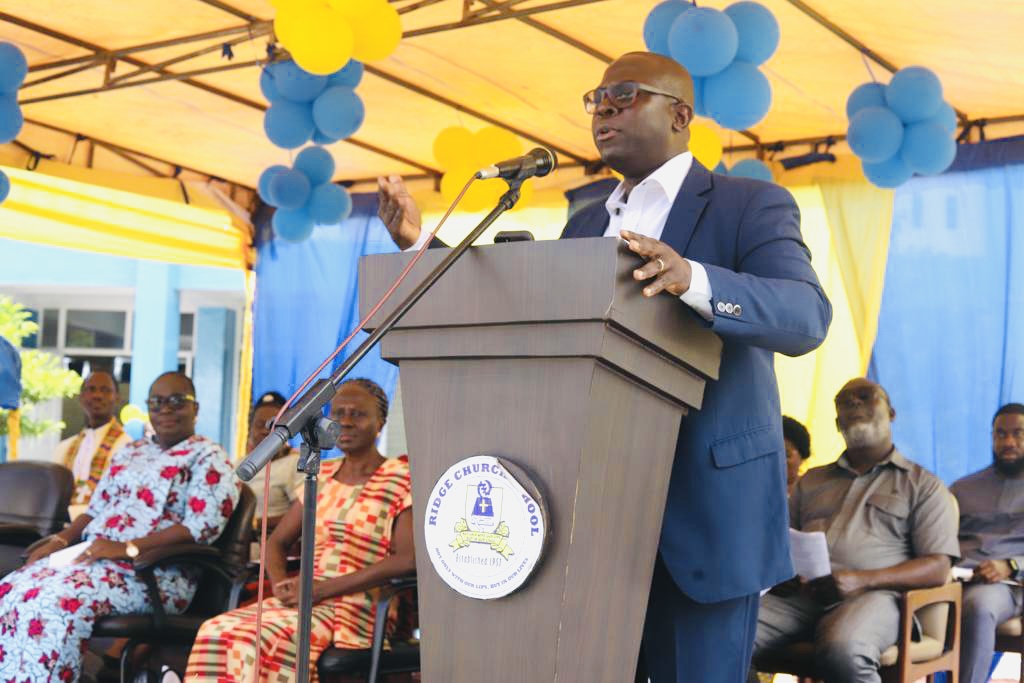
Be a Good Example in All Circumstances ~ 66th Annual Speech & Prize-giving Day, Ridge Church School
66TH ANNUAL SPEECH & PRIZE-GIVING DAY, RIDGE CHURCH SCHOOL
SPEECH BY DR. YAW PERBI, Global CEO of The HuD Group
26th August, 2023
Chairperson, Guest of Honour, School Board and Management, Teaching and Non-Teaching Staff, Parents and Learners, Invited Guests, (all protocols observed), good afternoon. It is an honour to return to Ridge Church School to address you today after leaving here 31 years ago. And it is a double honour as this is the second time I’ve been invited to do so over the last two decades.
The theme chosen for this year is BE A GOOD EXAMPLE IN ALL CIRCUMSTANCES and we shall consider it in three simple ways:
- WHAT IS?
- WHO SHOULD?
- WHY MUST?
1. BE A GOOD EXAMPLE IN ALL CIRCUMSTANCES: WHAT IS?
You must’ve heard from my introduction that my wife and I are blessed with seven biological children. Well, on Monday morning, our delightful six-year-old daughter, our fifth child called Nana Ahomka, came to tell me, “Daddy, I should be a leader at AWANA,” a children’s Bible training program. When I asked who a leader is she said, “Someone who sets an example for everyone else to follow.” I replied, “You got that right girl,” and that gave me the essence of my message today.
Today, the word “leader” is overused and abused. But for a moment, forget about all the 360 plus official definitions (yes) and consider this: a leader is someone who sets an example for others to follow. A good leader sets a good example; a bad leader does the opposite. Seeing it that way, a lot of so-called ‘leaders’ are really not good ones, even if they are in powerful political positions, are sensational speakers or even have top professions and enviable riches. Recently, we have seen our parliamentarians insulting and throwing physical blows in parliament. That is bad leadership. And it needs to be called out for what it is.
So WHAT IS being a good example in all circumstances? Good leadership or Godly leadership.
2. BE A GOOD EXAMPLE IN ALL CIRCUMSTANCES: WHO SHOULD?
Everyone of us, especially you, young ones—YOU ARE NOT TOO YOUNG TO BE AN EXAMPLE.
The Little boy Samuel was only 12 years old and could hear God’s voice at a time when “the word of the LORD was rare; there were not many visions.” [2] He heard God’s voice and told the ‘Papas’ of the land what to do. Ghana could use some Samuels right now—YOU!
That is what Paul the mentor meant when he said to his teenage mentee Timothy, “Don’t let anyone look down on you because you are young, but set an example for the believers in speech, in conduct, in love, in faith and in purity.” [3] In fact, sometimes it’s the adults that actually encourage us to do the wrong thing: I shall never forget my BECE experience in 1992 when a female invigilator who noticed I had completed my work, suggested to me to write the answers on an eraser so she could give it to another person who was struggling! Imagine that. An invigilator! I said, “No Madam. That is not right.” She was shocked.
Sometimes people don’t like us for not following their bad example or for calling out their bad example. But in a good society, good examples are reward. For example when I went to Achimota School, my good example was observed by the staff and I was selected to represent Achimota in exchange programme in America. It is also good examples who are selected to be prefects here, right?
Even at the university, I had to resist cheating in exams and started an organization called The HuD Group (The Human Development Group) [4] to help young people to become good leaders. When I got a national award for this, handed to me by then then Vice President of Ghana, Hon. Aliu Mahama, as the Newmont Ghana Highest Achievement Award winner at the Millennium Excellence Youth Awards in 2006, our Minister of Health then, Major (Rtd.) Courage Quashigah, wrote me a congratulatory letter, part of which read:
“We in the health sector are very proud of you and urge you to continue to be an Outstanding Achiever… It is my hope that you will bring your charisma and devotion to bear on every youth you encounter and they in turn will emulate your leadership example. On behalf of the entire health sector and on my own behalf, please accept my congratulations.” [5]
So WHO SHOULD be a good example in all circumstances? Everyone, especially you young ones!
3. BE A GOOD EXAMPLE IN ALL CIRCUMSTANCES: WHY MUST?
In 1792 King Louis XVI (16th) was taken from his throne by some rebels and imprisoned. His young son, the prince, was taken by those who dethroned the king. They thought that inasmuch as the king’s son was heir to the throne, if they could destroy him morally, he would never realize the great and grand destiny that life had bestowed upon him. They took him to a community far away, and there they exposed the lad to every filthy and vile thing that life could offer. They exposed him to foods the richness of which would quickly make him a slave to appetite. They used vile language around him constantly. They exposed him to lewd and lusting women. They exposed him to dishonor and distrust. He was surrounded 24 hours a day by everything that could drag the soul of a man as low as one could slip.
For over six months he had this treatment but not once did the young lad buckle under pressure. Finally, after intensive temptation, they questioned him. Why had he not submitted himself to these things why had he not partaken? These things would provide pleasure, satisfy his lusts, and were desirable; they were all his. The boy said, “I cannot do what you ask, for I was born to be a king.” [6]
Ladies and Gentlemen, we are all born to be kings and queens, princes and princesses, in the kingdom of God. WHY MUST you be a good example in all circumstances? You were born to be royalty.
CONCLUSION
In conclusion, be a good example in all circumstances. “The time is always right to do what’s right,” as Martin Luther King told some (Oberlin) students. Be an example, be a leader. As young as you are, even if everyone is doing the wrong thing and adults are pushing you to, be a prince/princess because:
1. that’s who you are—you were born to be a leader, to be king/queen
2. that’s what God’s word says and God expects
3. it’s for your own good (there’s no law against being a good example or punishment for it)
4. society needs it today and will remember you in history
5. Almighty God will reward you. Say, “Heaven backs me when I do the right thing!”
Be a good example—whether you are 6 or 60! Be the king and queen you were born to be. Be a good example in all circumstances, BE A GODLY LEADER!
References
[1] https://www.bbc.com/pidgin/tori-59738001[2] 1 Samuel 3:1, NIV
[3] 1 Timothy 4:12, NIV
[4] See www.thehudgroupglobal.org
[5] Portion of letter by Hon. Minister of Health in 2006, emphasis mine
[6] Sean Covey, The 7 Habits of Highly Effective Teens (and other sources)
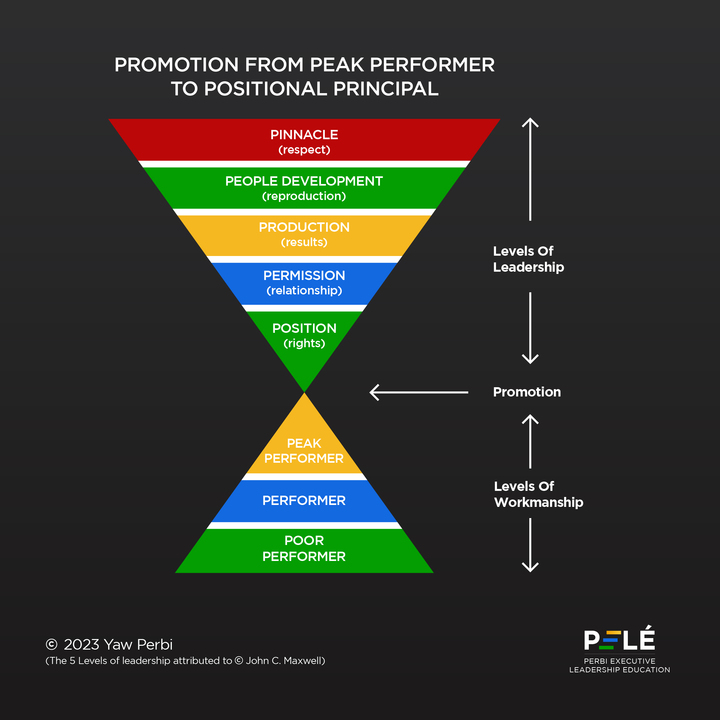
The Best Promotions are the Worst.
Here’s the worst thing about the best promotion. At one of my organizations, we recently had to let an excellent hire go. Come to think of it, we failed him. We failed him by promoting him.
You would think that all promotions are good but no. One of the worst kinds is being ‘elevated’ to become a leader just because you are an outstanding worker or producer. Working on stuff and excelling is very different from working with souls to excel. The reward for hard work is more work, weird yes, but the latter tends to be more mental work than manual —which most people find as more beneficial—also, more of working with people than working on things.
As one person shared about struggling with leadership upon her first promotion as a telco manager: “Within one month, I went from being the best programmer to the worst supervisor.” I’ve seen this happen to too many people in too many places. I grew up on the University of Ghana campus (both my grandfather and mother were professors there) and I would see time and time again fine lecturers promoted into leadership positions, from heads of department through deanship to vice-chancellorship and flail and fail. How many times have I said that a great chemist or erudite historian doesn’t necessarily make a great leader!
We do the same in the medical world, promoting top surgeons to head departments or if God doesn’t intervene, to head the hospital! When I was promoted to supervise the Military Polyclinic at the 37 Military Hospital in Accra, determining the doctors scheduling and all, in my opinion it was only because I wasn’t a bad doctor and had been around long enough. And no one gave me a minute’s training about leadership. Squat. Thank God I had been a private student of leadership for years prior.
It doesn’t start out as a bad thing; in fact, it is exhilarating at first for the recipient of the promotion. And the giver of the opportunity ordinarily also means well and feels good about it. But organizational leaders need to rethink the notion of making people supervisors, managers or leaders as a reward for diligent or even skillful individual technical work. It can backfire, seriously.
A STORY I CAN’T GET OVER
One of the most poignant illustrations of this phenomenon of worker/rewarded-as-leader is told by my mentor Bill George in his book ‘True North.’ It’s about the person who confessed upon her first promotion as a telco manager, “Within one month, I went from being the best programmer to the worst supervisor.” Here are some more details:
“It’s unbelievable how bad I was. I didn’t know how to delegate. When somebody had a question about their work, I’d pick it up and do it. My group was not accomplishing anything because I was on the critical path of everything. My boss saw we were imploding, so he did an amazing thing: He gave me every new project that came in. It was unreal. At 4:30 PM, my team would leave, and I’d be working day and night trying to dig through this stuff.
“Finally, I couldn’t take it any longer. I went to his office, stamped my foot like a 5-year-old, and said, “It’s not fair. I have the work of 10 people!” He sad calmly, “Look out there. You have 10 people. Put them to work.” It was such a startling revelation. I said sheepishly, “I get it.”” [1]
If this person hadn’t eventually learned to lead people, she would never have made it to becoming president and CEO of the American Red Cross on June 23, 2008. Prior to that she had also held top management positions at AT&T Corporation and Fidelity Investments. She is a member of the board of trustees of Johns Hopkins University and the board of directors of DTE Energy.
This is Gail J. McGovern we’re talking about here, even recognized by Fortune magazine in 2000 and 2001 as one of the top 50 most powerful women in corporate America. Alas, not all of such stories that begin with such ‘good promotions’ end well, and even when they do, not without significant damage to many.
DIAGNOSIS OF LEADERSHIP FAILURE POST PROMOTION
It takes both a different mindset and skill set to move from being an excellent worker to being a good leader, let alone a great one. Yet we come to the world of work with both a mindset and skillset that ill-prepare us for leadership success. Even prior, we are socialized largely to excel as individuals. I concur with Bill George that this unpreparedness is attributable to our upbringing:
“…so much of our early success in life depends upon individual efforts, from the grades we earn in school to our performance in individual sports to our initial work assignments. Admissions offices and employers closely examine those achievements and use them to make comparisons. …As we are promoted from individual roles to leadership, we believe we are being recognized for our ability to get others to follow us…
“To become authentic leaders, we must discard the myth that leadership means having legions of supporters following us as we ascend to the pinnacles of power. Only then can we realize that authentic leadership is serving people… How else can they unleash the power of their organization unless they motivate people to reach their full potential? … Only when leaders stop focusing on their personal needs and see themselves as serving others are they able to develop other leaders.” [2]
ROAD MAP TO LEADERSHIP SUCCESS POST PROMOTION
If Maxwell’s 5 Levels of Leadership is anything to go by, then when one is promoted from the top echelons of the worker floor (Peak Performer/Worker Level 3 in diagram above), they only end up at Level 1 of leadership: Position. The lowest level of leadership—the entry level, if you will—is position. People only follow if they believe that they have to (otherwise you might use your powers of carrot and stick). If this leader takes the hint and invests in their leadership growth, they can move to Leader Level 2—Permission—which is based on relationship. At this level, people choose to follow because they want to.
You will notice that even what Gail was trying to get done at work, putting the 10 people ‘out there’ to work, is still only mid-level in the Maxwell scheme of things: Production. Good leaders know how to motivate their people to GTD – get things done! And getting things done is what Leader Level 3 is all about. But they’re only good; not great. Leader Level 4 — People Development—can be summed up in another word: Reproduction. One’s goal at this level is to identify and develop as many leaders as one can and investing in them to help them grow. Here (Leader Level 4), you’re producing people as leaders, not producing work through people (Leader Level 3).
The most challenging and highest level of leadership, Level 5, is the Pinnacle. According to Maxwell, it requires longevity as well as intentionality in investing one’s life into the lives of other leaders and organizations for the long haul (while growing yourself as lifelong learner all the while). People follow such because of who they are and what they represent. Their leadership gains a positive reputation, betters still, one has earned respect.
Note that Level 5 leaders develop Level 5 organizations. I will add that in the leader versUs institutions debate—as to whether it is strong leaders or strong institutions we need to develop long-term—I would say that it takes Level 5 leaders to build the structures and systems that produce strong institutions. This is the realm of legacy. As a result, Level 5 leaders often transcend their position, their organization, their industry and perhaps even their nation.
And nothing accelerates leaders through these levels, from 1 to 5, like intentional coaching.
CONCLUSION
As you can tell already, it’s a long way from being the best worker to being a great leader. There is nothing more painful than a “highly capable individual” (as Jim Collins puts it) thinking that just because they’ve been a peak performer and ‘made it’ onto the supervision, management or leadership floor that they’ve got what it takes to run the ship. One’s productive contribution through individual effort in knowledge, skills and good work habits won’t cut it. As promoters, if we promote people and fail to plan a leadership growth path alongside that, we’ve inadvertently planned to fail them.
Congratulations on your promotion, but to ensure that dream-come-true doesn’t become a nightmare, and the reward a trap instead, you must be aware that it’s a floor and not the ceiling. Top floor workers’ triumphal entry through the golden portal of promotion only lands you as a ground floor leader. Welcome to Level 1 of Leadership: position. Just that.
References
[1] Bill George. True North: Becoming an Authentic Leader. Second edition; expanded and updated edition. Jossey-Bass, Hoboken, NJ, 2015, pg. 186-187.
[2] Ibid, pg. 185

The Inadvertent Lid of Political Leadership: My One Regret and Heartache.
It’s been a very busy few weeks. The last one in particular was the kind that Nelson Mandela would call “‘impossible’ until it’s done.” The very morn of the dawn I arrived back in Accra from Kenya, the first day of the work week, I had to be speaking at about 10am at an African Young Professionals Conference. That same week my team at PELÉ and the Ghanaian contingent of the African-wide BCA Leadership hosted the power-packed, two-day Made in Africa Leadership Conference (MLC) from June 13 to 15. Then there was a Youth Rally in the vicinity of the University of Professional Studies (June 15 evening) where l was billed to speak as well. And then to crown that week, The HuD Group, which I founded with eight of my friends in 2003, held a press launch of our twentieth anniversary and simultaneous launch of three legacy projects.
In all of this business and busyness, one thing that has come through very clearly is that leadership is absolutely important–that everything does rises and falls on leadership. I tried to make that point in my opening remarks to the distinguished ladies and gentlemen convened at the Marriot for the aforementioned MLC 2023. Even this morning, as I was training the executive team of one of our PELÉ clients, a tech start-up, Maxwell’s Law of the Lid came to the fore: leadership is the lid on their personal level of effectiveness as well as the organization’s impact that it would ever make.
Leadership is so important that every professional must have it, everyone in every sector of the economy must possess it, and everyone at every level of society must have it but especially leadership is too important to leave it to politicians alone. “Leadership is cause,” as one other leadership expert puts it, “everything else is effect.”
As we celebrate 20 years of The HuD Group, we can testify that God has done amazing things in, on, with and through The HuD Group. We started in Ghana, moved to Cote D’Ivoire, then to Nigeria and Canada and now have a presence in 24-25 countries on all continents, having incredible impact on people in every sphere. In fact, at the anniversary launch last week Friday, several VIPs like celebrated, young, award-winning journalist Manasseh Azure Awuni, shared how The HuD Group had impacted them. But I shared with the audience my one regret: that in all this 20 years of The HuD Group we did not give enough attention to the political space in particular. Of course, it is not that we did nothing at all but knowing what l know now and seeing how successes in all these other areas of life have literally been eroded by what has happened in the political space, especially in Ghana, that really breaks my heart.
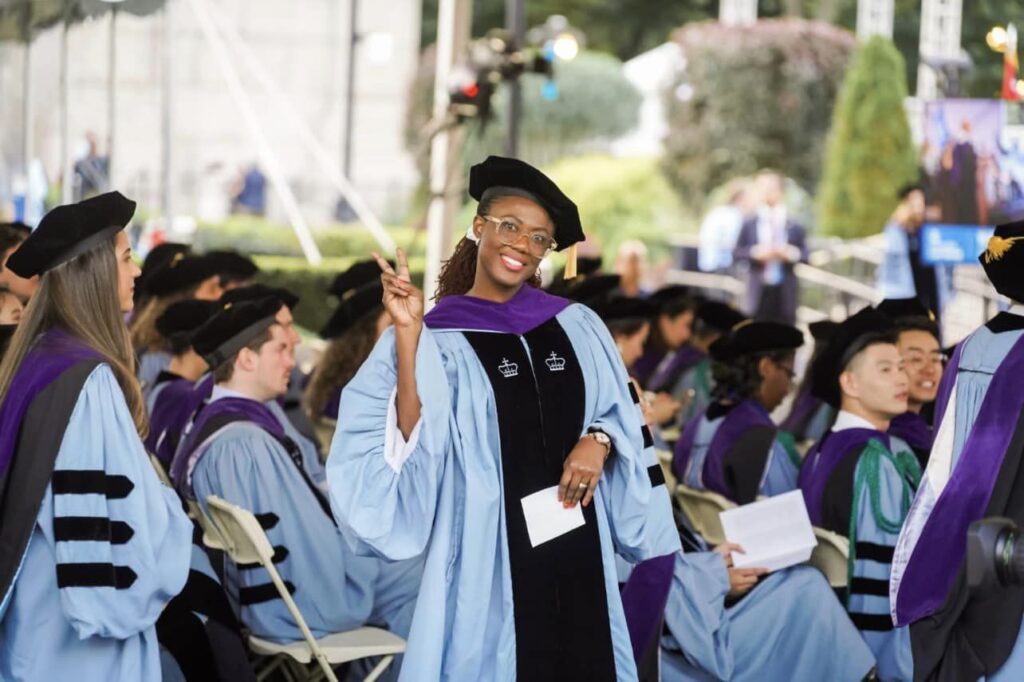
This brilliant friend just graduated from Columbia Law School. I told her I was going to share this beautiful photo on social media as it illustrates my frustration that a lioness like her will be returning home to Ghana only to be led by goats.
THE SKY ISN’T THE LIMIT; POLITICIANS ARE
This has been a season of lots of graduations. I’ve seen flashy photos from Harvard to Fuller, and been physically present at inspiring commencements like Ashesi’s about three weeks ago. First, I’ve been excited about all these amazing graduates bustling with energy and vision and drive, some having done some earthshaking capstone projects and all. Yet all these amazing people formally graduated by our best academic establishments and semi-formally by The HuD Group in the last 20 years—and yes, some of us have been though all kinds of fellowships from Aspen and Eisenhower to Tutu—are restricted by what happens in the political space because everything rises and falls on that leadership. Political leadership is the lid over all our collective effectiveness and greatness.
If anyone told these graduands that the sky is the limit, that isn’t wholly true; our political leaders are. No I’m not a whiner; I am precisely the opposite of that, which is why I’m a serial entrepreneur. So I believe in creative ways around ‘the system’ but as the august chairperson of the HuD anniversary launch, Madam Yawa Hanson-Quao, had earlier said at the MLC, “We cannot entrepreneur our way out of bad governance.” Political leadership is the lid over all our other attempts at leadership.
Political leadership is the lid over all of our collective effectiveness and greatness in all of our fields of work and spheres of influence. We’ve got to get up and take the political space seriously and not let anyone who is not a selfless, authentic, transformational leader make their way there! Because then, it doesn’t matter how the collective brilliance of all of us is, there would be a lid over the rest of us. A good illustration is the proverbial army of sheep led by a lion versus or an army of lions led by a sheep.
At the end of the day, every sector, and every level of our society needs at least good leaders, even better, great leaders! Otherwise like John Gardener aptly puts it, “The society which scorns excellence in plumbing as a humble activity and tolerates shoddiness in philosophy [or politics for that matter] because it is an exalted activity will have neither good plumbing nor good philosophy: neither its pipes nor its theories will hold water.”
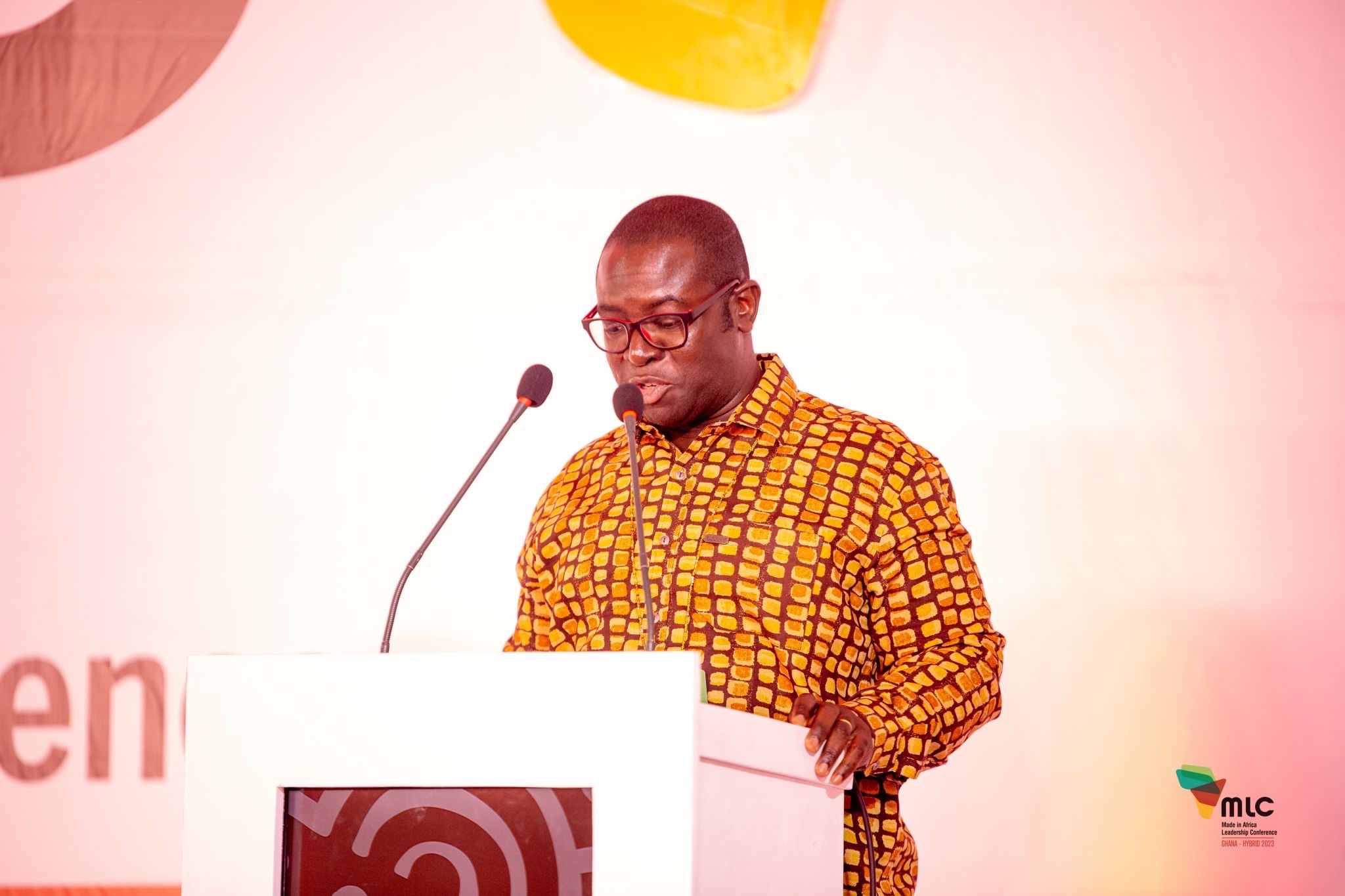
Sans Leadership–So Much to Lose, Too Much to Lose.
The following was shared as a TED-like talk to open the Made in Africa Leadership Conference by BCA Leadership on June 14 at the Marriot Hotel, Accra, Ghana.
My uncle died. My mom’s youngest brother. He came over to Ghana from the United States, where he had lived for decades, and fell ill. He died in the very hospital I worked in at the time. In fact, he died on my ward. But I can swear it wasn’t his disease that killed him. It was leadership, or rather the lack thereof. Leadership is too important for doctors not to have it.
Some of the most important things in life are not taught in school, like leadership. When some of my friends from university got into government I did exhort them: “Nobody taught us Jack about leadership. LEARN LEADERSHIP! CONTRACT COACHES! Leadership is not just caught; it is taught.” Did they listen? Ha!
Ironically, communal, national, continental or even global leadership, is a deeply person-al thing. It takes deeply transformed leaders to deeply transform society. Authentic leadership begins with aligning what goes on in a leader’s head and heart with True North. Leadership principles or True North are no respector of persons—red or yellow, black or white.
Two days from now, we will be officially launching the 20th anniversary celebration of The HuD Group, a holistic leadership organization started by nine young Africans in Accra. From one country in West Africa, it now has presence in 24 countries, on all six continents. Out of Africa to the Rest. From a former Rwandan refugee now in executive leadership in Uganda to a former child soldier in Sierra Leone now a high-ranking bank official in his homeland, to a Chinese-Canadian who we trained via Skype when she was an international medical student in Australia, a lot of transformation and impact has been achieved but in Ghana in particular I feel much of our gains have been eroded by not giving adequate attention to political leadership.
So today is the first of two important occasions this week where I will be drumming home this point with all my heart, liver, spleen and intestines: “Leadership is too important to leave it to politicians alone.” AND with 90% of African businesses being SMEs, creating 60-80% of our jobs and accounting for 40% of our GDP, what we do here at MLC this week for African leaders and African leadership is wildly important.
When two 14-year old stowaways from Guinea, Yaguine and Foday, froze to death in the landing gear of an Airbus 330 from Conakry to Brussels, they had on them a hand-written letter labelled: IN CASE WE DIE… to the Messrs. members and officials of Europe.
They said, among other things, “We have the honor and pleasure and great confidence in you to write this letter … we appeal to your solidarity and kindness for help in Africa. …we, African children and youth, ask you to create a great, efficient organization for Africa to allow us to progress. …we want to study and we ask you to help us in Africa to study to be like you.”
You should find and read the whole letter here—it will thaw and tear your heart. And that was 24 years ago. Has anything changed?
It’s time for Leadership Made in Africa that makes Africa work for Africans. BEFORE WE DIE. Yes we can, partnering and collaborating to reimagine and reform the Africa that we want! Twende! Let’s go! Let’s do this!
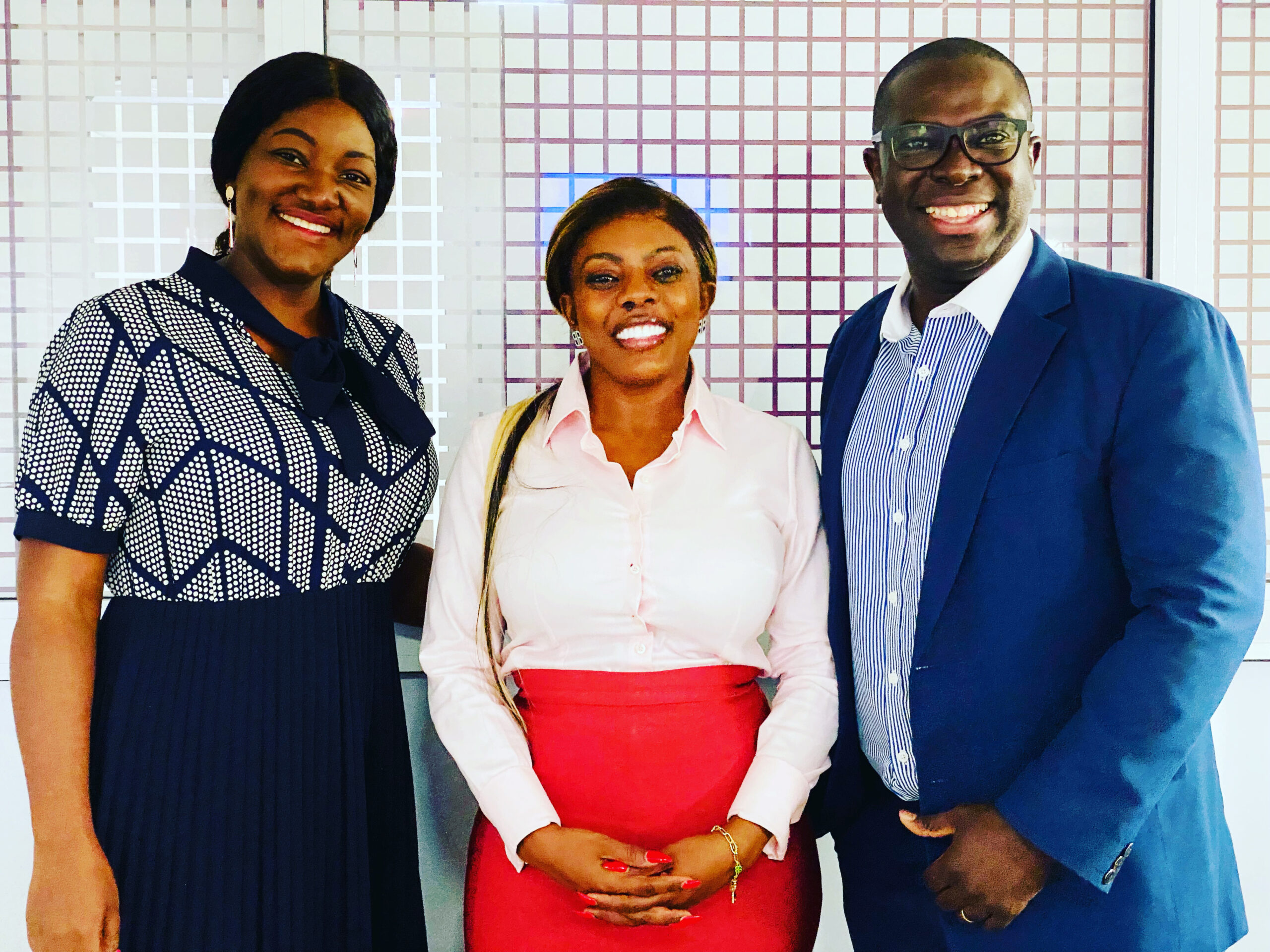
Of Kanévals, Kanébals & Kanévores.
Co-founders of Perbi Cubs sandwiching Kanéval partner-influencer, Nana Aba Anamoah, media personality & General Manager of GHOne TV/Starr FM.
This year, the capital city of Ghana where my wife hails from and where I was born has been named by UNESCO as its twenty-third World Book Capital. Accra takes over from Guadalajara, Mexico (2022) and will be handing the baton to Strasbourg, France come April 2024. Since ‘kané’ is the Ga word for read—and Ga being the language of the Accra people—Perbi Cubs Library services creatively replaced the near-homophonic ‘carni’ in ‘carnival’ with ‘kané’ and coined the word ‘Kanéval’ to bring fun to reading, which is otherwise unfortunately perceived widely as a bore and a chore.
As official partners of UNESCO Accra World Book Capital 2023 (AWBC ‘23), Perbi Cubs will be organizing Kanéval as a fantastic year-long program, a traveling fun fair transitioning from place to place with lots of amusements intertwined with lots of reading. You will find a fuller history of the UNESCO AWBC’23 partnership and details of the year-long fiesta here.
RESCUE FROM KANÉBALS
We are of the conviction that this Kanéval social service campaign needs to involve key influencers from all walks of life, from CEOs to Black Stars players to musicians, to consistently show that reading is fun and leads to success. The campaign will consist of various events in-person and online, including book fairs, storytelling sessions, and community outreach programs. By making reading fun and accessible, we can encourage more people to read and ultimately improve literacy rates in the community.
When we began approaching various influencers to join us on this reading revolution campaign, a massive behavioural change intervention, some of the stories we heard about the generally poor reading attitudes and habits of Ghanaian society were stupefying. We found kindred spirit in Nana Aba Anamoah (photo above), media personality and General Manager of GHOne and Starr FM, who unbeknownst to us had years back initiated a reading campaign known as ‘Raising Readers.’ She too had involved several influencers, including former Ghanaian president Jerry John Rawlings, to read with the children in a certain deprived area of Accra. Book donations in their thousands to the cause were a shot in the arm.
At some point it was clear parental involvement would bolster this behavioural change campaign. Some parent did accompany their children and wards to the reading sessions. Mostly reluctantly. In spite of these mostly illiterate parents sucking their teeth after only a little while, thinking of all the other more ‘productive’ ways they could be spending their time, Nana Aba and team pressed on. In fact, at the height of her intervention they had decided that once a week was not enough for the pace and profundity of the transformation they sought so they decided to leave books with the families and replace them when they returned the week after.
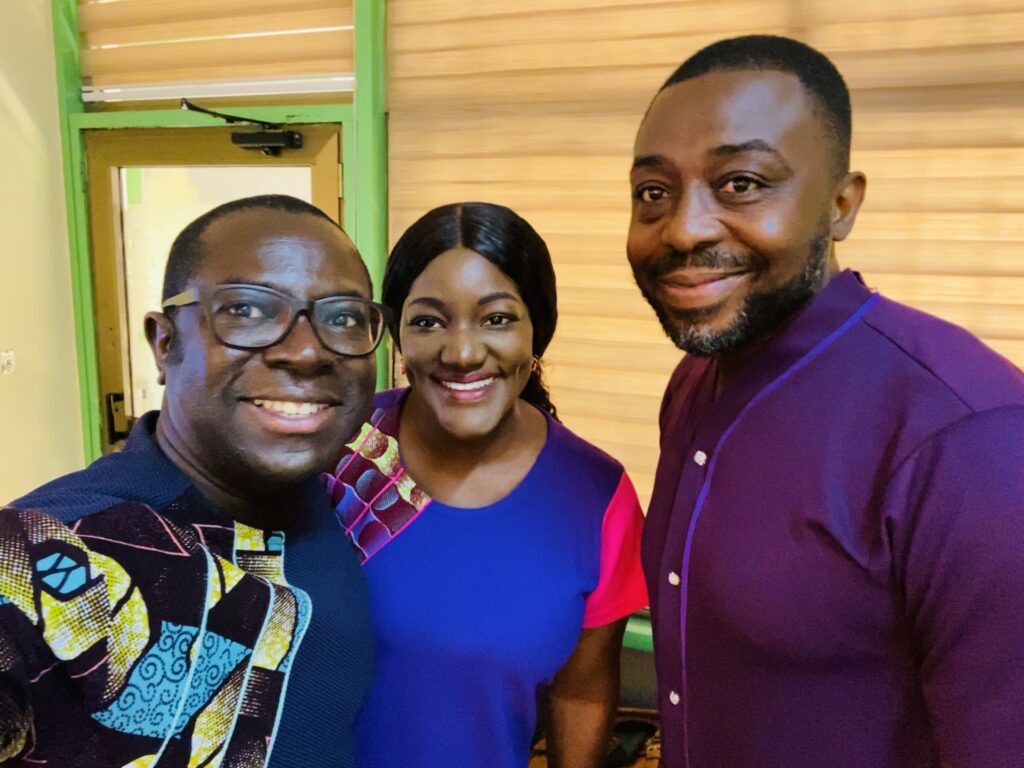
Cofounders of Perbi Cubs with yet another partner-influencer, Kafui Dey, author and GTV Breakfast host
All seemed well and good until the following week when some medical doctors on the Raising Readers campaign team who had gone down the road to grab some snacks returned with horror on their faces. When Nana Aba relates this story, she might not be aware but her face betrays the pain of the let-down she felt. The snacks that the team mates purchased in the catchment area had been nicely wrapped in freshly torn out pages of last week’s books! Kanébals (do you see what I’ve done with ‘cannibal’ and ‘kané’?) had dismembered the hitherto living literary friends, ripping them from their saddle-stitched and perfect-bound spines and repurposing the cadavers as food packaging. Ah!
When we related this story to another influencer on our bill, Kafui Dey (photo above), author and Breakfast host on GTV, he told us worse. Sometimes it’s pages of even the Bible that are Kanébalized for wrapping food!
WANTED: KANÉVORES IN THE KAPITAL
Perbi Cubs, convinced that readers are leaders and leaders are readers, has from inception sought to raise lion-leaders, hence the referral to our 10,000 young patrons as cubs (the young of lions) rather than the typical ‘kids’ (the young of goats).
By the end of the year-long Accra World Book Kapital, we seek to have enrolled an army of at least 100,000 cubs who are voracious readers, Kanévores. If carnivorous lions are the king of the jungle, we imagine that Kanévores rule the world.
KALL TO ACTION
According to UNESCO, as of 2021 only 6% of children in classes two and three in public basic schools could read and understand anything they read. Lack of sufficient reading resources and very large class sizes are among the root causes of the problem, but the overarching root cause is that society does not value reading. Reading is seen as a chore, a punishment or even a necessary evil! Yet per credible research, the love for reading is a stronger indicator of a child’s success in school and their future career than even their parents’ level of education and their socioeconomic status.
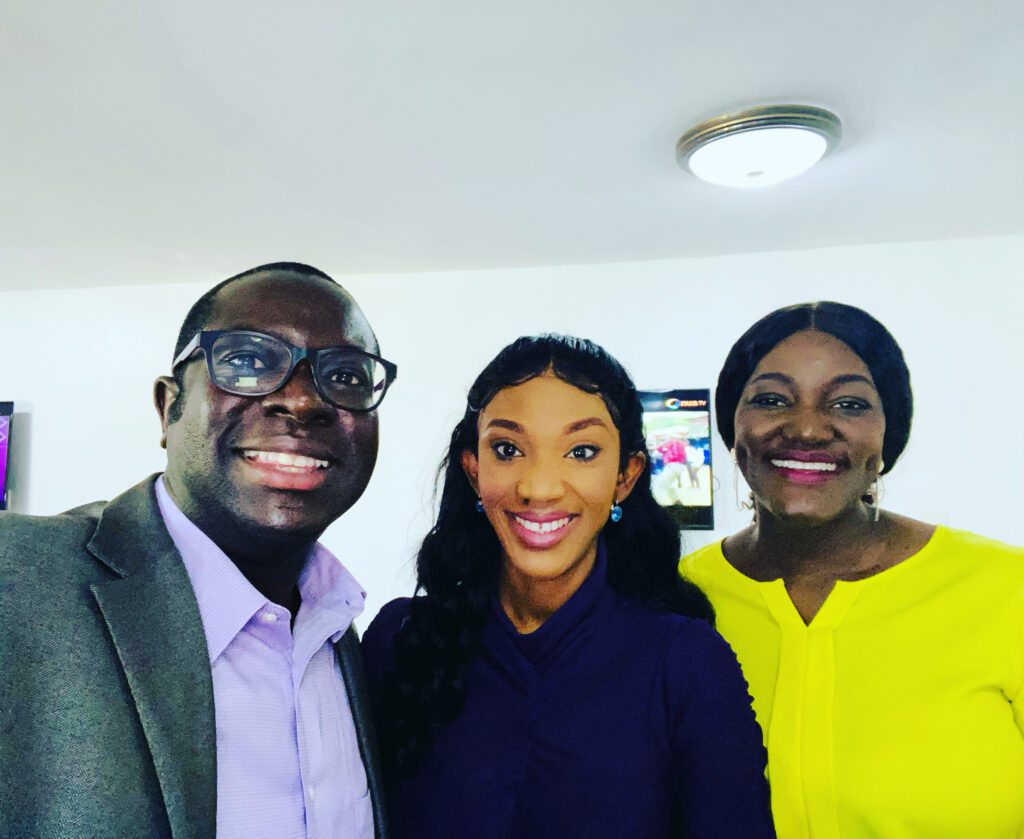
With media personality and reigning Ghanaian Journalist of the Year, Portia Gabor, at the TV3 studios in Accra. Portia’s partnering Perbi Cubs for this vital social intervention, Kanéval!
Join us in promoting the joy of reading and improving literacy rates in the community, particularly among children in public basic schools, by becoming a partner for Kanéval. Together, we can make a real difference in the lives of our community members and future generations. Let’s celebrate and make the most of Accra’s selection as UNESCO World Book Capital 2023.
KONCLUSION
Accra has been selected as UNESCO World Book Capital 2023 and Kanéval is a one-year social service campaign organized by Perbi Cubs, as official partners of UNESCO AWBC 2023, to celebrate this achievement and promote the joy of reading and improving literacy rates in the community.
The success of the campaign depends on a coalition of all stakeholders in the book industry, influencers, and strong partnership with the media. Together, through massive Kanévals all year, we can raise Kanévores and end apathy towards the written word that results in Kanébalism and the like. May readers rise and leaders come to light to transform society and impact the world—from Africa to the Rest.
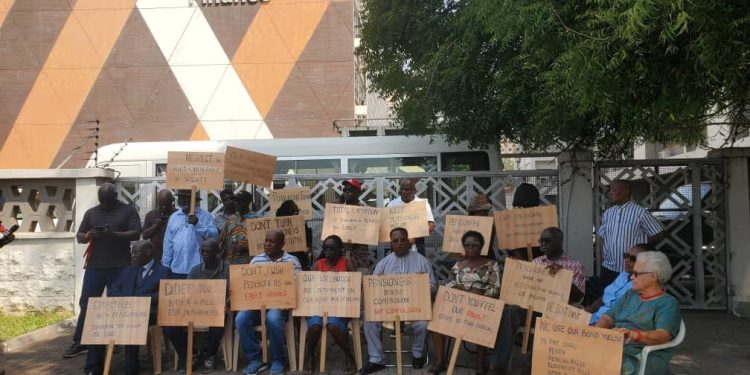
FROM PROFESSOR TO PICKETER: The Lost Generation and the Missing Money
Ghana is neither worth living for nor dying for. That’s how many feel at the moment. Honestly. Think about this: I’ve known Uncle Kweku since his graduate student days on the University of Ghana campus. I was only a lad then. He would later complete his graduate studies, an MPhil in linguistics, and top it up with a PhD from Oregon, USA.
After an illustrious career as an academic (see his brief bio here on the University of Ghana website) he not only retired as a full professor but even served as Pro Vice-Chancellor of Ghana’s premier university. What do we find the illustrious son of Ghana doing these days? Picketing on the premises of Ghana’s Ministry of Finance to demand that the government exempts his and fellow pensioners’ bonds from being sequestered in the dubious Domestic Debt Exchange (DDE) programme. I know for a fact that virtually all of Prof. Kweku Osam’s pension monies are in these bonds. Ei! A former Chief Justice also picketing alongside the other day is reported to have said, “I am over 70 years now. I am no longer government employed, my mouth has been unguarded, and I am talking, and I am saying that we have failed.”
“BACK TO THE FUTURE”
When Uncle Kweku overtly verbalized to the media in an interview on one of the picketing days that he would dissuade his children from ever investing in the Government of Ghana’s financial instruments because “they are risky,” he seemed to have read my mind. Seriously. For while I agree that it is despicable to draw the aged into this DDE debacle and punish pensioners who have planned well for their future and lent their own monies to government to work with, I have an even greater concern for the young people of the country who might take decades to recover from this rude shock. It has taken years to grow a savings and investment culture in Ghana.
As previously started in an earlier article on this matter, “I am pained that, ‘The fathers have eaten sour grapes, and the children’s teeth are set on edge’ (Ezekiel 18:2). For over 20 years now, The HuD Group and I have championed a culture of savings and investments in Ghana, and had the JOY of seeing thousands heeding the call, especially young people.” I recently met one of the young men I used to travel the country with to inspire and teach young people to form investment clubs and start investing. He’s currently the managing director of a major investment company in Ghana. He intimated how this whole DDE disaster made him shed several kilograms over a month, being at the receiving end of verbal and other forms of abuse from frustrated and fearful investors. At the time we spoke, people were withdrawing an average of 100 million Ghana Cedis each day from his outfit. He had already dispatched 2.5 billion Ghana Cedis when we held our conversation.
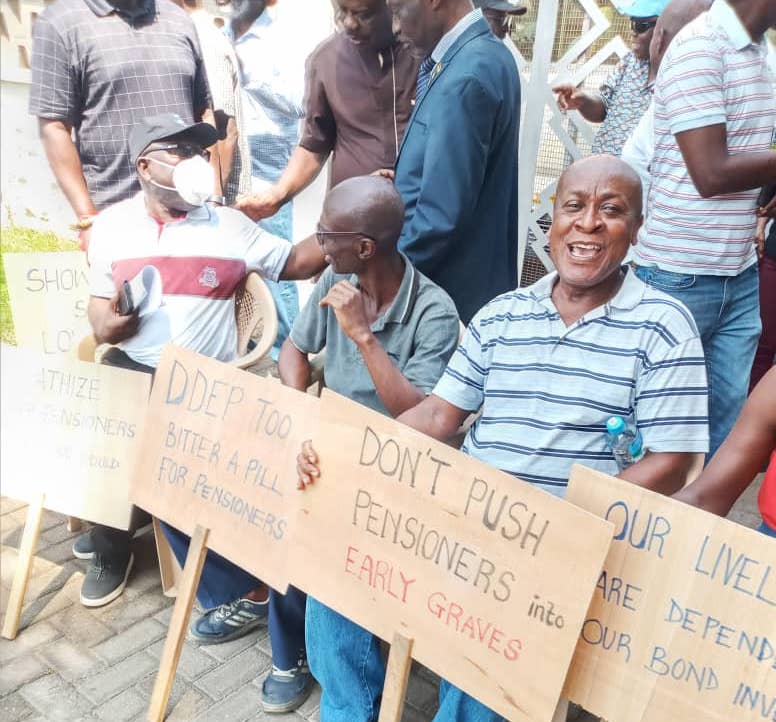
A zoom in on Prof. Kweku Osam, picketing at the Ministry of Finance, with his fellow pension bondholders
BACK TO THE PENSIONERS
So what exactly are we working for? The calibre of pensioners-turned-picketers is disheartening: doctors, engineers, civil servants… If retired professors and chief justices are protesting, what about the no-namers and the many who are too old or too ill to hit the streets? I am privy to a WhatsApp message Prof. Kweku Osam sent that was meant to be just informational, but ended up being very transformational for me:
The last time I took part in a public demonstration against a government of Ghana was in May 1983, as a fresh graduate student. That was when students in the country rose up against Rawlings and his PNDC. Today, God willing, I’ll join fellow Pensioner Bondholders to protest at the Ministry of Finance. The government should leave Pensioner Bondholders alone. Touch not the Pensioner Bondholders.
Think about it: Uncle Kweku began his working life protesting the government. Forty years later, he is ending his working life with yet another anti-government protest. Virtually all his lifesavings is now being held at ransom by a government that has misled and mismanaged her affairs, Covid-19 and Russia-Ukraine notwithstanding. After forty years of wandering in the wilderness between the 1983 protest and the present one on the eve of our sixty-sixth independence commemoration, Ghana itself is a pensioner by age, without much to show for it. We’ve got to do better for our people, old and young alike. Seriously.
Prof. Osam’s generation–my parents’ generation–is the same one the current Finance Minister, Uncle Ken, belongs to. It is the same crop of people who plotted military coup d’etats a generation ago in their youth. Now they won’t exit quietly either, not without a financial coup de grace. With trepidation, dare I call them the lost generation? And they did not only lose themselves and their way, they lost money–theirs and ours.
But to what will my generation and those following rise, having clearly observed that Ghana is not worth living for and Ghana is not worth dying for? That’s how many feel at the moment. Honestly. Think about it.

O National Cathedral of Ghana: My Hopes and Fears Have Met in Thee.
In the interest of full disclosure, first of all I am a Bible-believing, Jesus-following, Spirit-filled African Christian. Secondly, at the time of writing, I have no membership of any political party—just a citizen who passionately loves his motherland and has served both major political parties when called upon. Finally, I comment on the National Cathedral of Ghana matter primarily as a missiologist and leadership scholar. These thoughts were largely shared on the Cit FM/TV current affairs programme The Big Issue on 21st January, 2022. The crux of my submission, that the project be halted and audited, was also carried on Citi News Room here.
THE THING THAT I FEARED HAS HAPPENED
My first article on the proposed National Cathedral of Ghana in August 2018 was entitled in a manner that exposed the battle that raged within me upon hearing the president of the Republic of Ghana announce his vision to put up a national cathedral. It was an inquiring heading: “National Cathedral: Vulgar or Virtuous Venture?
In it, I confessed “my unwholly holy initial thoughts, honest-to-God,” sharing my initial skepticism about the project, mainly concerned about it being a mere political scheme to siphon monies, only with a nice religious façade. Secondly, I questioned the prudence of it amidst the poverty and sheer lack of basic infrastructure and public services in a developing country (NB. This was before Covid would hit and make everything that was bad, worse). Thirdly, I was wary of the perilous path of Europe where centuries old grand cathedrals now only stand as emblems of a once-upon-a-time vibrant Christendom while the faith itself is dying today, precipitously. Even then, one need not cross the oceans to note the dangers of religious opulence over pragmatic faith. Just look next door, right across the Ghana border to the near-white elephant of the Notre Dame de La Paix in Yamoussoukro, whose proposed community-impacting hospital as an attachment to assuage the papacy’s guilty conscience is till yet to see the light of day, thirty-two years later.
As I studied the cathedral proposal further, especially as an African missiologist, its merits rose above my cynicism and mounting hopes tamed my fears to the extent that I was willing to give the project a chance, even my support. In fact, not only was I present at the foundation stone-laying, I wrote a cogent trilogy about how even the president might not be fully aware of the extent to which Almighty God may be using him to accomplish His glorious purposes in and through Africa, especially considering this unique moment in history where the once derided “dark continent” now has more Christians than any other continent and will double that lead by 2050, with more Christ followers than the next two continents (Latin America and Europe) combined! In fact, a summary of the trilogy even made its way into the Cathedral’s published magazine.
Over the last couple of years since then, I have found my faith in the project on a slippery slope back to where it first began, with supposed scandal after seeming scandal and allegation upon allegation that rival the corporate sins of the Arthur Andersons and Enrons at the turn of this century (if not making them pale in comparison), that do not befit an edifice for the King of kings. The opacity in the project’s financial dealings, including estimated project costs, eye brow-raising fund transfers and amorphous government seed money, make nonsense of the God who is light, in whom there is no darkness at all. The purpose of this rejoinder is not to dive into each of the smudges and spots on the project but to put on record that while I have enumerated prior at least a dozen reasons this could be a virtuous project, like ‘the greatest man in the East’, for me too, “the thing I greatly feared has come upon me” (see Job 3:25-26). I seek to document for posterity my revised position on the National Cathedral of Ghana for not only are my values being violated, the very faith in whose name this edifice is being erected is endangered.
NOODLED & NUANCED
This cathedral matter is a very nuanced one and thus requires the highest levels of leadership competence, care and character to navigate it. What do I mean? Four things. First of all, the president is not a king; he cannot just pronounce edicts, fiats and decrees at an enlightened citizenship. Secondly, we don’t live in a theocracy, but in a fairly vibrant democracy (although admittedly we are a pseudo secular state with our national anthem and pledge referring to ‘God’). Thirdly, private-public partnerships can be a tricky dance. And finally let’s face it, things are hard socioeconomically right now!
As if all of this is not enough, the president in particular hasn’t shown the kind of great leadership in casting vision (constantly, compellingly, creatively) and galvanizing the people from the grassroots. To make matters worse, the government itself has lost the trust of the Ghanaian people with its economic mismanagement, real and imagined, poor emotional intelligence in matters like this and poor consultation culture–from this cathedral issue through the recent e-levy saga and even current Domestic Debt Exchange debacle.
Then the process itself has been fraught with paucity of information and poor communication, poor governance (really governance 101), low accountability and too much opacity. In fact, in my frustration the other day while preaching on an Ephesians chapter five text about leading and living in the light I bellowed, “Stop the Cathedral in the name of the Lord!”
Don’t get me wrong. There are pluses about this project. Many. Between my initial article and the subsequent trilogy you will easily find a dozen cogent reasons why this could be a virtuous venture, including how the cathedral is more than a building (although the Africanization of it, its tourist attractions and income generation nature per se are all something to write about). The fact that the cathedral has a mandate to be a convenor of national conversation and debate warms my heart.
If the government had kept to its initial promise of providing “just the land” and only “seed capital,” I’ll be at peace. It is for the body of Christ to build this cathedral to the glory of the LORD, but considering the nature of Christianity in our Ghanaian public sphere and the prime place of faith for the African this is a nuanced matter. Any good government would have a keen interest in this matter, hence the sense in situating the NCG in the country’s capital city’s ceremonial core to provide “the missing link” (words of the architect) as a final piece of a national puzzle. Apparently, the other national pieces are all already in place: the people’s place (international conference centre, national sports stadium), the people’s representatives’ place (parliament building and State House), the peoples’ heroes’ place honouring the dead (Osu cemetery and adjoining military cemetery).
Granted, it isn’t everyone who is able to appreciate that we are a building a nation here; not just an eclectic collection of utilitarian infrastructure. That’s how come although we still have children learning under trees we still have national stadia and presidential edifices like Jubilee House and Peduase Lodge. To build or not to build this cathedral is really a nuanced and noodled matter that requires a certain high level leadership that I, honestly, haven’t seen on the horizon.
THIS ISN’T A ZERO SUM GAME
As a missiolgist, I believe that even the president does not fully know or understand the magnitude and implications of his vision. His initial vision may have been personal but vision is often progressive and it is possible He is being used by the Sovereign God in ways the man himself cannot fully comprehend, let alone the masses crying out against this vis-à-vis the impoverished state of the state. In order not to repeat the dozen or so cogent reasons why this project can be worthwhile, I will strongly encourage you to take a look at trilogy 1, the second part and the final installation, all from March 2020.
GOING FORWARD: SEVEN STEPS
1. STOP! STOP! STOP!
This may very much sound and look like the ‘STOP WORK’ in red paint on uncompleted building projects by the Accra Metropolitan Assembly (AMA) yet, I see red flags all over this project that require concomitant red paint markings all over it too. This is not from the AMA this time. Just “we the [Ghanaian] people” saying, “STOP WORK!”
2. AUDIT
Secondly, let us get any of the so-called ‘Big Four’ global auditing firms in the country to do a thorough audit of the NCG secretariat, board of trustees and other associated names like JNS Talent etc.
Sometimes those AMA signs not only read, “Stop Work” but continue with “Produce Permit.” I would say for this cathedral project, in conjunction with step one, let us also “Stop Work and Produce Audit.” The result of the audit will help clarify our next steps—if even this project should continue at all, and if it should, how.
3. CALL FOR CONVERSATIONS AND DEBATE
Let us on purpose have a broader conversation and debate of the best minds and hearts for the way forward. “In the multitude of counselors there is safety,” said the wisest man that ever lived. And this is a sagacious king who could’ve easily ignored the counsel of others. Interestingly, he put up the most magnificent temple in the whole world in his day, for YHWH. Even Africans like the Queen of Sheba travelled long distances to come and see. If we want to see the reverse today, others come from elsewhere to behold the magnificence of the NCG, then we had better consider wise, broad-based consultation.
In my humble opinion, this government has been unbelievably militaristic; so non-consultative! Yet the thing is that even if people do not agree, they will support the project, or at least not be as antagonistic, because they have been seen (recognized) and heard. Conversations and debate will cause the significant groundswell needed for such a massive national venture with international ramifications.
4. GIVE OURSELVES TIME
If from the pause, audit, conversations and debates it becomes apparent that this project should continue, then we must give ourselves time. This cathedral doesn’t have to be built by 2024 and ready for a January 2025 swearing-in. That is precisely part of the problem with this project: the fact that the president is in a hurry to put this up while he is in office.
While a sense of urgency is good, undue pressure because of time crunches leads to many mistakes and often unethical behaviour, no matter how hitherto virtuous one’s cause. For example, this strange exchange of over two million Ghana Cedis between a whole national project and a private individual’s company obviously happened because apparently the project couldn’t wait for government funds to clear (this issue is under investigation, and rightly so). Besides, things are über hot in the economy right now, Ghana’s caught up in a socioeconomic inferno. It is wisdom to let both the times and tempers cool off.
If this is truly a national cathedral and not H.E. Nana Akufo-Addo’s pet project, then it should stand the test of time by traversing other administrations—perhaps two or even three terms down the line, including opposition parties—and be owned by all and sundry. If is by the good people of Ghana it for the glory of Almighty God, then we are not in a hurry. When we are not in a hurry we can think properly, do things appropriately, follow due process… Time is money and time will save us a lot of money—and a multitude mistakes.
5. TRANSPARENCY! TRANSPARENCY! TRANSPARENCY!
“This is the message we have heard from him and declare to you: God is light; in him there is no darkness at all” (1 John 1:5, NIV). Even some corporations have more transparency and better governance than the current supposedly religious project. Anathema! If this is truly an edifice to the Most High God then there cannot be even a hint of inappropriateness and misappropriation. As it stands now, not only has there been too much darkness and opacity surrounding a building that is to be a Lighthouse for the nations; too many allegations and suspected scandals that even some ordinary government projects cannot rival.
My mind goes to another cathedral project’ in ancient times where it was said, “They did not require an accounting from those to whom they gave the money to pay the workers, because they acted with complete honesty” (2 Kings 12:15, emphasis mine). I’m afraid we cannot say this of the NCG people or process so far.
6. LET GOD’S PEOPLE BUILD GOD’S BUILDING
The government of Ghana has done more than enough, giving the land. And way more seed than was my impression at the start of the project. If this sanctuary is really for the LORD then let’s let the Body of Christ in the country build it. And yes, we can! Christians have literally put up thousands of edifices strewn across the length and breadth of the country, ‘from Gambaga to Accra, from Wiawso to Keta.’ Let the Church do this for the glory of Almighty God. We thank the generous government of Ghana for the head start but no more government/tax-payers’ funds, please.
Let God’s people be able to say, like in Nehemiah’s day, “The God of heaven, he will prosper us; therefore we his servants will arise and build.” Whenever God gives a vision, He also makes the provision. But if this venture isn’t of God, then we are on our own; it will be hard.
For a number of great cathedrals that have been built, people have felt so privileged to be a part of the history-making that they have voluntarily given, not just of their substance but of their very selves. Carpenters, masons and other artisans and professionals have offered their services for free, and not the case of exorbitant amounts being paid to the current architect and others. In my opinion, the celebrated architect should feel so privileged to do this for God and country that he does this gratis! You tell me how much we paid the designers of our national flag and presidential stool; or composers of our national anthem and pledge.
7. WORK AS PASSIONATELY ABOUT OUR ‘SOFTWARE’ AS WE ARE ABOUT THIS ‘HARDWARE’
By software I mean our values, our paradigms and attitudes etc. The nation is so full of poor work ethic, corruption, filth (environmental and figurative), incompetence, dishonesty, lack of integrity etc. yet we want to build a magnificent cathedral for God. There is so much grievous poverty in the lives of the majority yet we want to put up this ceremonial and celebratory infrastructure at a cost of $400 million in the heart of Accra. The scriptures are replete with what God requires of us, first and foremost, and it is not so much physical buildings as that our spiritual, social, mental and emotional states reflect His glory; also, that our physical bodies will be hallowed as His temple. So as we are excited about the hardware (physical building of a cathedral), o how I pray that we are equally excited to work on our values, attitudes, morality, ethics, true selves, true faith and integrity. We also ought to disciple our sectors and systems of Ghanaian society so that these reflect a people that believe in a righteous and excellent God, the Most High.
CONCLUSION
Despite the bold vision of the NCG, we haven’t as a people or leadership displayed the kind of competence (eg. vision casting, convincing communication, broad consultation), character (eg. transparency, accountability) and compassion (eg. sensitivity to the present economic plight of the Ghanaian people) that a project of this magnitude demands.
I believe if we took the above seven steps, that should put us in good stead and hopefully lessen the painful memories and bitter aftertaste that this project would otherwise bring us. I do not believe the NCG is an entirely vile venture; but neither will it be entirely virtuous without great leadership in its purpose and process. Repentance and restitution must take place where the audit finds wrong and the best way forward forged as a body politic. The virtues in the idea of a national cathedral can be redeemed and the dead and near-buried hope and glory resurrected. This project can still bring God glory and bestow blessing on not just Ghana but the nations of the world if we would be quick to vanquish the evils that crouch at the foundation and front steps of this edifice. But for now, both my hopes and fears of these past six or so years have come to a head in this embattled National Cathedral of Ghana project.
Post Script
It was heart-warming to find that a couple of the National Cathedral’s Board of Trustees members, namely Archbishop Nicholas Duncan-Williams and Rev. Eastwood Anaba, reiterated my January 21 call above to ‘stop work and produce audit’ barely two days later, January 23, 2023. It was soon followed by a formal press release by the chair of the Board, Rev. Prof. Opoku Onyinah the next day, following a January 23, 2023 Board of Trustees meeting at which they agreed to engage Deloitte, one of the Big Four accounting firms in the world, to carry out an audit.
The hope expressed in the final paragraph of the said press release is mine too: “It is the hope and trust of the Board of the National Cathedral of Ghana that once these nagging issues are satisfactorily dealt with, the public interest and confidence in the project would be restored and rekindled to enable the citizenry to contribute generously to complete the Cathedral to the glory of God.”

On Saving a Nation.
The story is told of a man who traveled from a developing country to a more economically advanced one in search of a better life. Upon arrival, the man was shocked to find that no one managed the local milk shop. Customers would take what they needed from the refrigerator, leave the exact amount of money for their purchase, and be on their way. Neither the milk nor the money was under lock and key. This would never happen in my country, he thought.
The only thing that surprised the man more than the honor system of the unmanned milk dispensary was the price of the product. The milk was cheaper here, even though his country had more milking cows than people—and in turn produced more milk. How could this be? Then it finally hit him. The higher price at home included the additional costs of dishonesty and thievery.
In his country, locks would be purchased for the refrigerator and money box. A worker would be hired to conduct the transactions. Another person or two would be hired as security, in addition to needing expensive CCTV cameras. This is not to mention the added logistical and utility costs from inefficient or unreliable systems. It all adds up, reflected in the price of a single bottle of milk.
What the society of the man’s home country lacked in cultural values, it paid dearly in economic value—in other words, a higher cost of living than a country with a higher standard of living.
The commercial cost of values
What makes a nation great and strong, ultimately, is its people and their values. Societal values determine what people consider good or important, and this informs how they act. If we consider present-day Ghana in this context, we are likely to be disappointed.
Money and material possessions. Greed and selfishness. These values permeate our society. So I thought it wise to speak to the issue of values in terms of commercial costs. My hope is that even those who place money and materialism and personal gain above all else—including the common societal values espoused in our national anthem and pledge—will realize that real values, such as service and integrity, still affect their bottom line. They will make more money with them, than without.
Consider that Warren Buffet, one of the world’s richest men and most successful investors, advises leaders to look for three things when assessing job candidates: intelligence, initiative, and integrity—but to weigh integrity above all else. If a worker lacks the latter trait, Buffet says, “the first two will kill you. Because if you’re going to get someone without integrity, you want them lazy and dumb.”
It is with near-total trust that we poke an opaque tin of milk and pour out its content without a second thought. We’ve got to trust the regulator, trust the manufacturer, and trust the entire supply chain. A friend and former senior manager in a company that produces perishables once told me that the company would destroy whole batches of product at the slightest hint of compromised quality, because the negative cost of their brand being brought into disrepute would be much greater in the long run than the temporary loss of the thousands of dollars flushed down the drain by an honest act.
Values at the core of a nation
Little drops of values at the individual, family, organization, and sector levels of a society eventually coalesce to make a mighty nation. This is how I have long thought of Ghana. As a mighty nation, rich in social and cultural values to emulate.
I grew up in the early 1990s, when neighboring countries like Liberia and Sierra Leone were decimated by war. Hordes of refugees made their way into Ghana. As a World Vision Youth Ambassador, I toured refugee sites in the country with donors, and the tentative nature of life in tents made me tear up. I have always been grateful to God that Ghana in my life has been an island of peace in a sea of strife.
But bombs and bullets are not the only way to destroy a country. Rather than exploding in external violence, a society can implode through internal valuelessness. I fear Ghana is on this path. I see it all around. We have swung from one extreme to another in a few generations. My grandfather cared little about money or material possessions. He was not alone. How often can we say such things now?
Too often, money and materialism seem to the motivation for the world around us, even at the peril of our lives and at the cost of future generations. Look no further than the dastardly acts of inordinate illegal mining (galamsey), stinky corruption in politics and public service, brazen cheating in exams, rampant illegal practices which combine modern internet-based fraud with African traditionalist rituals (sakawa), food sellers using dirty (waste) water to cook, changing expiry dates on expired medicine or outrightly selling fake medicine… need I go on?
Building the Ghana we want, rooted in values that matter
I worry that in our hurry to catch up with the rest of the industrialized world, we are focusing on infrastructure, industry, and education without a values-based foundation. For instance, STEM education is being touted as the panacea for the challenges we face. But what use is STEM without roots? STEM or any other body of knowledge must grow from a deeply rooted network of shared social and cultural values and norms. Otherwise, patients needlessly die, shoddy infrastructure inadvertently collapses, common funds are looted, and justice is denied.
Ghana is at a crossroads, not just economically, but also culturally. There is a commercial cost to values that must be recognized and incorporated into the policies needed to set Ghana on a more prosperous economic course. Thankfully, influential Ghanaians are talking about it.
Earlier this year, the African Center for Economic Transformation (ACET), which is based in Accra and was founded by Dr. K.Y. Amoako, a Ghanaian, organized a retreat at at the Peduase Valley Resort for more than 50 people representing various civic and political stakeholder groups and organizations in Ghana. The topic of conversation was a new initiative that is set to launch officially in the coming days: the Compact for Ghana’s Political and Economic Transformation.
A roadmap for a stronger democracy and lasting economic prosperity, the Compact is a hopeful approach because it is rooted in strengthening our common values. I attended the Peduase Valley retreat, and values featured heavily in the discussion. It was stressed that the quest for Ghana’s economic and political transformation is meaningless unless it is underpinned by a radical shift in our mindset and values.
Indeed, the discussion focused on identifying values we can glean from the national anthem, the pledge, and the lyrics of “Yɛn Ara Asaase Ni,” written almost a century ago by Dr. Ephraim Amu, one of the fathers of our nation. From the conversation, values such as honesty, selflessness, hard work, and loyalty stood out.
Such discussions must continue in Ghana. Particularly, the all-binding value of integrity needs to be ingrained in every stratum and segment of our national life if we are to realize a greater Ghana, rooted in values that matter rather than tarnished by ones that do not.
Although less dramatic, a definite way to destroy Ghana without bombs or bullets is by eroding the very values that birthed the nation, slowly but surely. “Whether or not this nation prospers,” goes the resounding anthem from Dr. Amu, “clearly depends on the character of the citizens of the nation.”
Dr. Yaw Perbi has practiced medicine in both his home country, Ghana, and with the United Nations Operation in Cote d’Ivoire as a U.N. peacekeeper. He is the founder and Global CEO of The HuD Group, inspiring holistic emerging leadership development in 25 countries on all continents. He is co-founder of PerbiCubs, an edtech company impacting over 8,000 children in Ghana. Yaw is a Fellow of the Africa Leadership Initiative as well as the Aspen Global Leadership Network.


